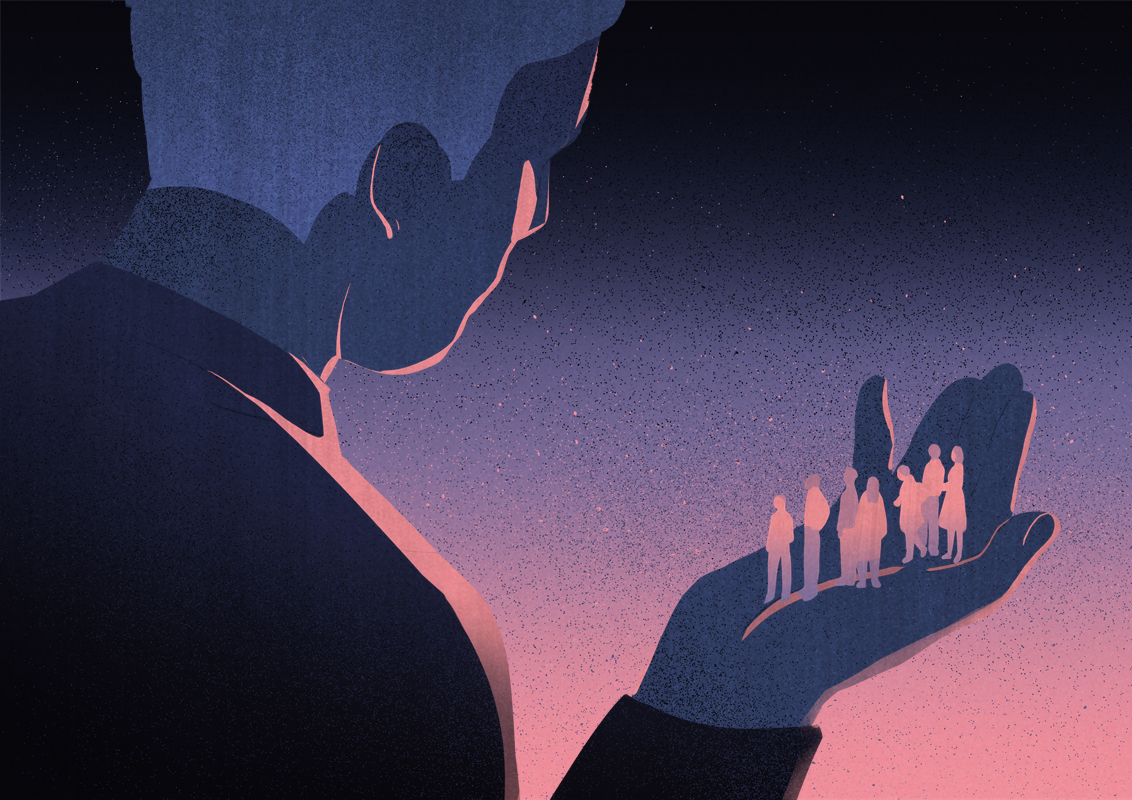Oder: Nieder mit dem Advocatus Diaboli
Einer Person of Colour begegnen ein Leben lang weiße Menschen, die auf unterschiedliche Weise über das Thema Rassismus reden wollen. Eine Form, die mir besonders häufig begegnet und durch ihre tückische Beiläufigkeit auffällt, ist eine männlich kodierte Position des Bescheidwissens oder des Mansplainings: genauer die des weißen Mannes, der gerne Advocatus Diaboli, den Anwalt des Teufels, spielt.
Die Erfahrungen und die Lebensrealität von Betroffenen werden von ihm als rein theoretisches Gedankenexperiment behandelt – denn diese Probleme sind für den Außenstehenden nur theoretisch, nicht realistisch erfassbar. Es macht ihm Spaß, über die Rechte und Existenzen von PoC zu diskutieren: „Lasst uns darüber sprechen, warum euer Existenzkampf diskutabel ist.“ Die tatsächlichen Probleme sind für ihn wie ein Spielball, denn sie betreffen ihn nicht. Er kann es sich leisten, sich munter über Definitionen von Rassismus zu äußern, denn er erfährt die Müdigkeit, die emotionale Arbeit, das Trauma und die Diskriminierung hinter dem Begriff nicht am eigenen Leib.
Rassismus-Debatten werden von ihm aufgegriffen, um die eigene vermeintlich kosmopolitische Fortschrittlichkeit und Belesenheit zur Schau zu stellen. Vielleicht auch, weil er einem „aktuellen Trend“ folgen will. Ohne Bedenken übergeht er die Lebensrealitäten von PoC sowie die gewählten Mittel, mit denen Betroffene ihre Erfahrungen kommunizieren. Aus purer (Schaden-)Freude an der Diskussion wird eine problematische Aussage in den Raum geworfen, nur um sich anschließend unter dem schützenden Mantel von „Zu einer Diskussion gehören auch Gegenmeinungen“, „Das darf man ja wohl noch sagen dürfen!“ und „Meinungsfreiheit“ zu verstecken. Unter diesem Deckmantel liegt die Tücke des Phänomens: Betroffene erkennen den Typus nicht immer sofort, doch lesen die Situation als äußerst unangenehm. Womöglich realisiert man nicht richtig, wieso man sich so herabgewürdigt fühlt. Es ist doch nur eine wissenschaftliche Debatte, alles komplett objektiv – oder?
Dass der Außenstehende am Ende ausweicht, in passiv-aggressive Defensivhaltung verfällt und seine problematischen Aussagen als rein hypothetische oder gar wissenschaftliches Gedankenexperiment bezeichnet, gehört dabei zur gängigen Technik. Wichtig ist hierbei zu betonen, dass es ihm nie darum geht, zu lernen oder das eigene Wissen zu erweitern. Ganz im Gegenteil: Er will Dinge beim Alten belassen, denn er profitiert vom aktuellen Status Quo. Das Ziel des weißen Mannes in dieser Situation ist es, seine eigene Überlegenheit und Deutungshoheit zur Schau zu stellen. Das Wichtigste ist, dass ihm weiterhin Aufmerksamkeit geschenkt wird. Insbesondere dann, wenn er ausnahmsweise einmal nicht im Zentrum steht.
Was passiert also, wenn Betroffenen wieder und wieder darauf hinweisen, dass sie von diesen Gedankenexperimenten verletzt werden? Was passiert, wenn sich zahlreiche Stimmen von PoC gegen diese demütigenden Diskussionen erheben?
Leider nur wenig. Uns wird Emotionalität, Empörung und fehlende Empirie vorgeworfen, welche im krassen Gegensatz zur Wissenschaftlichkeit und Rationalität des reinen Beobachters ständen. Wenn wir uns nicht auf eine Fortführung der Gespräche einlassen und keine kostenlose Bildungsarbeit leisten möchten – sei es aus Erschöpfung, Angst, Zeitmangel, fehlenden Ressourcen oder sonstigem Grund –, wird uns vorgeworfen, nicht offen zu sein und keine ertragreichen Diskussionen zu wollen. Die Schuld liegt nie bei demjenigen, der Erfahrungen in Frage stellt, sondern immer bei denjenigen, die sich nicht für die Evidenz ihrer traumatischen Erfahrungen rechtfertigen wollen. Das bringt mich zur Frage: Wie reden wir über und mit Betroffenen?
Ich habe diese Spielchen satt. Wer tatsächlich im Fokus stehen sollte, sind Menschen, die Rassismus erleben. Ihre Erfahrungen und Perspektiven sind viel wertvoller für unsere gesellschaftliche Entwicklung, als es eine polemische Debatte, ob diese Erfahrungen überhaupt real sind, jemals sein könnte.
Christina S. Zhu arbeitet als Illustratorin und studiert im Master an der UdK Berlin. Sie engagiert sich für intersektionale Antidiskriminierung und ist Referentin für Antidiskriminierung des Inneren im AStA, Mitglied der studentischen Initiative I.D.A. und der AG Critical Diversity.


Fantastischer Artikel, der sowohl theoretisch fundiert wie auch mit emotionaler Intelligenz besticht. Tatsächlich ist das Bestehen darauf, ein Argument – gerade um
soziale Phänomene! – nur um „reine Rationalität und reine Objektivität“ bauen zu wollen, eine wahnsinnig veraltete und epistemologisch unüberdurchdachte Weltanschauung, die bereits in den 70ern durch die Writing Culture Debatte kritisiert wurde. Affekttheorie und ein herausarbeiten und anerkennen von Positionalitäten, die durch historische Gegebenheiten und gesellschaftlichen Konventionen geprägt sind (vs. top-down approach ohne Hinterfragen der Biases von den Bestimmungs- und Kontrollinstanzen ) wird nach dem heutigen Stand der Sozialwissenschaften eigentlich gross geschrieben. Der Mensch ist halt nicht ein rein „logisches“ Wesen, bzw. Auch Affekt und Emotionen folgen einer gewissen Systematik und Logik, die man zwingend mit Empathie mit(be)denken muss, wenn man Zugang zu einer kritischen Analyse wünscht – nicht umsonst werden Grundsätze zur Ethik und Empathie in ethnologisch-qualitativen Methoden um Feldforschung und Alltagspraxen als Grundsteine mitgegeben. Rassismus kann und muss man entsprechend schon auch als eine Art von Wissens- und Informationssystem verstehen (siehe Stuart Hall) , aber um sich einen fruchtbaren Umgang damit erarbeiten zu können, ist ein Mitbedenken von historisch/gesellschaftlichen Privilegien und der eigenen Positionalität zwingend von Nöten. Sich dieser Blickökonomien bewusst zu werden, ist ein prozeduales Geschehen, bei dem POC‘s halt wirklich oft die emotionale Aufklärungsarbeit leisten müssen; da kommt man leider nicht drum rum. Die gute Nachricht ist aber, dass bereits vor uns schon sehr viele, wahnsinnig intelligente und kompetente POC’s wie auch weisse Akademiker sich einen Kopf drum gemacht und all das bereits verschriftlicht haben – darum reicht dann manchmal ja schon einen Verweis & eine Leseliste darauf.
extrem guter Text. Ich bin schon vielen Männern dieses Typs begegnet, und kann mir nicht vorstellen, wie viel mehr auslaugend Gespräche mit denen als PoC sein müssen…das schwierige ist, dass man ja auch diese Leute irgendwie überzeugen können muss, aber wie?